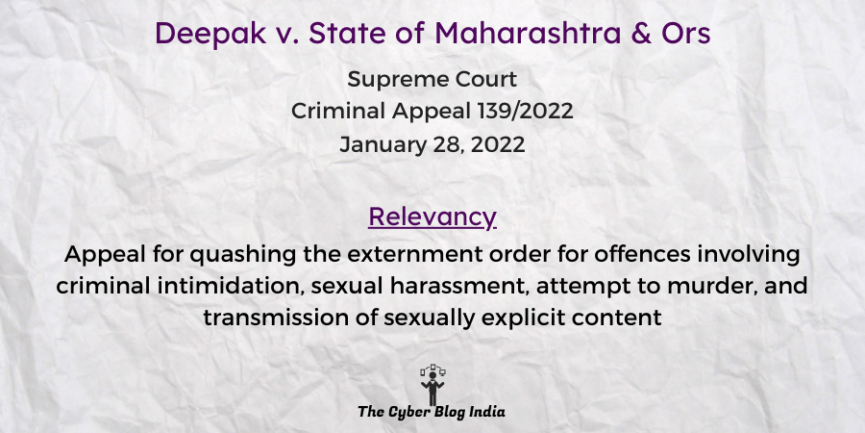Deepak v. State of Maharashtra

Deepak v. State of Maharashtra & Ors
In the Supreme Court of India
Criminal Appeal 139/2022
Before Justice Ajay Rastogi and Justice Abhay S. Oka
Decided on January 28, 2022
Relevancy of the case: Appeal for quashing the externment order for offences involving criminal intimidation, sexual harassment, attempt to murder, and transmission of sexually explicit content
Statutes and Provisions Involved
- The Information Technology Act, 2000 (Section 56, 67, 67A)
- The Indian Penal Code, 1860 (Section 354, 354A, 354D, 509, 501, 506)
- The Code of Criminal Procedure, 1973 (Section 151(3))
- The Constitution of India (Article 19(1)(d))
- The Maharashtra Police Act, 1951 (Section 56)
Relevant Facts of the Case
- The Maharashtra Police Department issued an impugned order of externment against the appellant. This order directed him to remove himself from the Jalna district for two years.
- He has committed multiple offences between 2013 and 2020. These offences include criminal intimidation, attempt to murder, sexual harassment, outraging a woman’s modesty, breach of trust, and transmission of sexually explicit content.
- The police relied on two confidential in-camera testimonies from witnesses who requested anonymity.
- The appellant filed an appeal before the Appellate Authority. The authority subsequently denied the appeal. He filed a writ petition before the Bombay High Court, challenging the externment order.
- The High Court noted that the appellant’s crimes are severe and grave. The refusal of two witnesses to testify indicates that he is extremely dangerous. As a result, the High Court dismissed the writ petition.
Prominent Arguments by the Advocates
- The appellant’s counsel contended that in the most recent case, the complainant’s father is the local MLA, and she has abused her father’s authority to file a false case. The counsel relied on her statement, stating that her father had instructed her to call the appellant and share images with him.
- The appellant’s counsel argued that two confidential witness statements neither accused nor proved any allegations. The first three cases were stale and had no active link to the externment order.
- The respondent’s counsel submitted that the Maharashtra Police Act, 1951, does not require the authorities to provide reasons. Furthermore, the authorities did record the reasons for existence for the maximum time of externment.
Opinion of the Bench
- The impugned order lacks mental application and is irrational and weak.
- Since the police did not record their subjective satisfaction with the order of externment, they cannot impose the maximum term of two years.
- The Division Bench of the High Court failed to recognise that an order of externment is not a common measure. The authorities should only pass an order of externment in exceptional circumstances.
Final Decision
- The bench granted the appellant’s appeal. Furthermore, the bench quashed the externment order and the High Court’s order.
